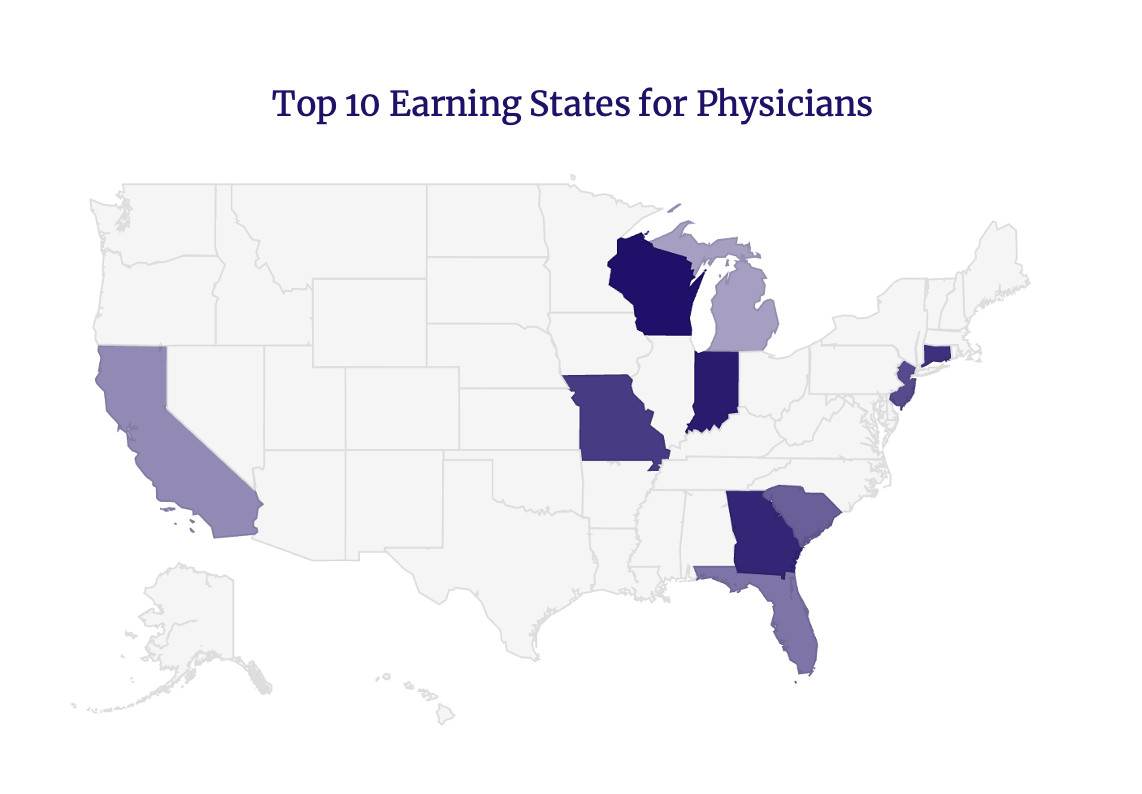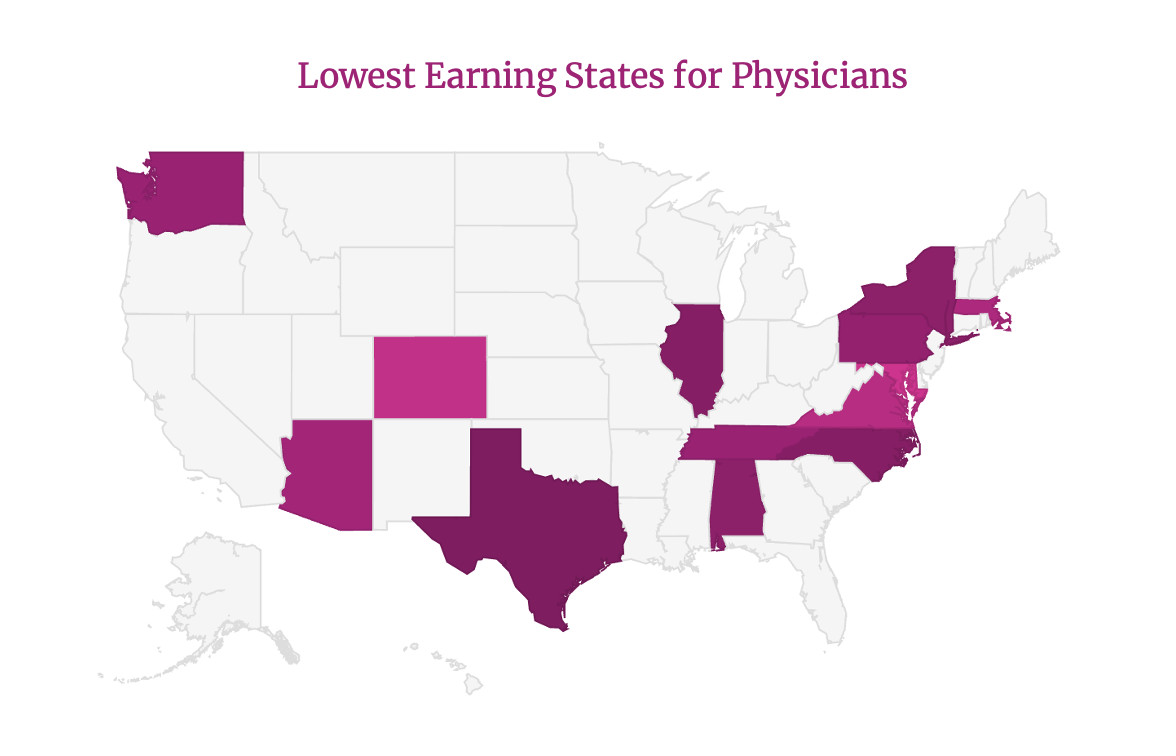For those aspiring to a career in medicine, understanding the potential financial rewards is a crucial aspect of career planning. The salary of a Doctor of Medicine is not only a reflection of their expertise and years of rigorous training but also a significant factor in managing personal finances and repaying medical school loans. This guide provides a comprehensive overview of doctor of medicine salaries in 2024, exploring the highest and lowest paying specialties, geographical variations, and key trends in physician compensation.
How Much Do Doctors Get Paid?
Physician salaries in the United States continue on an upward trajectory. According to the latest MedScape Physician Compensation Report 2024, the average doctor salary in 2023 reached $363,000 across all specialties. This represents a notable 3% increase from the previous year, indicating a positive trend in physician compensation. Breaking down this average, Primary Care Physicians (PCPs) earned an average annual salary of $277,000, while medical specialists commanded a higher average of $394,000. However, it’s essential to recognize that these figures are averages, and a Doctor Of Medicine Salary can fluctuate significantly based on several factors, most notably their chosen specialty and practice location.
Average Doctor of Medicine Salary by Specialty
The medical field encompasses a wide array of specialties, each demanding unique skills and expertise. This specialization is directly reflected in the compensation doctors receive. Certain specialties consistently rank among the highest paying, while others, often focused on primary care, tend to be on the lower end of the salary spectrum. Below is a ranking of medical specialties based on their average annual doctor of medicine salary, offering valuable insights for those considering their career path.
- Orthopedics: $558,000
- Plastic Surgery: $536,000
- Cardiology: $525,000
- Urology: $515,000
- Gastroenterology: $512,000
- Radiology: $498,000
- Dermatology: $479,000
- Anesthesiology: $472,000
- Oncology: $464,000
- Otolaryngology: $459,000
- Surgery, General: $423,000
- Ophthalmology: $409,000
- Critical Care: $401,000
- Pulmonary Medicine: $397,000
- Emergency Medicine: $379,000
- Pathology: $366,000
- Ob/Gyn: $352,000
- Neurology: $343,000
- Nephrology: $341,000
- Physical Medicine and Rehabilitation: $341,000
- Psychiatry: $323,000
- Allergy and Immunology: $307,000
- Rheumatology: $286,000
- Internal Medicine: $282,000
- Family Medicine: $272,000
- Public Health & Preventive Medicine: $263,000
- Infectious Diseases: $261,000
- Pediatrics: $260,000
- Diabetes and Endocrinology: $256,000
Source: MedScape Physician Compensation Report, 2024
Top 10 Highest Paying States for Doctors
Geographical location plays a significant role in determining a doctor of medicine salary. States with higher demand, higher cost of living, or specific healthcare needs often offer more competitive compensation packages to attract and retain physicians. The following are the top 10 states in the U.S. where doctors earn the highest average annual salaries.
 U.S. map illustrating the top earning states for doctors, highlighting Wisconsin, Indiana, Georgia, Connecticut, Missouri, New Jersey, South Carolina, Florida, California, and Michigan.
U.S. map illustrating the top earning states for doctors, highlighting Wisconsin, Indiana, Georgia, Connecticut, Missouri, New Jersey, South Carolina, Florida, California, and Michigan.
- Wisconsin: $397,000
- Indiana: $372,000
- Georgia: $363,000
- Connecticut: $362,000
- Missouri: $361,000
- New Jersey: $360,000
- South Carolina: $360,000
- Florida: $359,000
- California: $358,000
- Michigan: $356,000
Source: MedScape Physician Compensation Report, 2023
Top Earning Metropolitan Areas for Doctors
While state-level data provides a broad overview, doctor of medicine salaries can be even more concentrated in specific metropolitan areas. These urban centers often boast larger hospital systems, higher patient volumes, and specialized medical facilities, leading to increased earning potential for physicians. Here are the top 10 metropolitan areas in the U.S. with the highest average annual salaries for doctors.
- San Jose, CA: $474,977
- Los Angeles, CA: $448,121
- St. Louis, MO: $442,576
- Sacramento, CA: $440,004
- Minneapolis, MN: $438,756
- San Francisco, CA: $437,628
- Phoenix, AZ: $436,837
- San Diego, CA: $430,187
- Charlotte, NC: $429,566
- Las Vegas, NV: $426,727
Source: Doximity 2024 Physician Compensation Report
Lowest Paying States for Doctors
Conversely, some states report lower average doctor of medicine salaries. This could be attributed to factors such as lower cost of living, saturation of physician workforce, or different healthcare reimbursement models. Understanding these lower-paying states is equally important for a comprehensive view of physician compensation across the U.S.
 U.S. map depicting the lowest earning states for physicians, including Maryland, Colorado, Virginia, Massachusetts, Arizona, Washington, Tennessee, Pennsylvania, Alabama, New York, Illinois, North Carolina, and Texas.
U.S. map depicting the lowest earning states for physicians, including Maryland, Colorado, Virginia, Massachusetts, Arizona, Washington, Tennessee, Pennsylvania, Alabama, New York, Illinois, North Carolina, and Texas.
- Maryland: $306,000
- Colorado: $327,000
- Virginia: $330,000
- Massachusetts: $331,000
- Arizona: $334,000
- Washington: $338,000
- Tennessee: $340,000
- Pennsylvania: $344,000
- Alabama: $348,000
- New York: $348,000
- Illinois: $350,000
- North Carolina: $350,000
- Texas: $353,000
Source: MedScape Physician Compensation Report, 2023
Lowest Earning Metropolitan Areas for Doctors
Similar to the highest paying regions, examining the lowest paying metropolitan areas provides a granular perspective on doctor of medicine salary variations. These areas may face different economic conditions or healthcare market dynamics that influence physician compensation. The following are the ten lowest earning metro areas for doctors in the U.S.
- San Antonio, TX: $371,073
- Denver, CO: $371,215
- Washington, DC: $371,495
- Boston, MA: $378,273
- Nashville, TN: $380,533
- Baltimore, MD: $382,837
- Philadelphia, PA: $387,254
- Providence, RI: $390,096
- Virginia Beach, VA: $390,604
- Birmingham, AL: $391,290
Source: Doximity 2024 Physician Compensation Report
Medical Specialties with the Largest Compensation Growth
While overall physician salaries are rising, certain medical specialties experienced particularly significant increases in compensation in 2023. According to MedScape data, Physical Medicine & Rehabilitation, Neurology, Nephrology, and Allergy & Immunology witnessed at least a 9% growth in average salary. This substantial increase may reflect growing demand in these fields or adjustments in healthcare reimbursement models. Conversely, Plastic Surgery, a traditionally high-paying specialty, saw a notable 13% decrease in average salary, highlighting the dynamic nature of physician compensation across different specialties.
The Gender Pay Gap in Physician Salaries
Despite progress in gender equality, a persistent gender pay gap remains a reality in the medical profession, mirroring broader trends across various industries. In 2023, the overall gender pay gap for physicians narrowed slightly to 23%, an improvement from 26% in 2022. However, the Doximity 2024 Physician Compensation Report indicates that female physicians still earned an average of $102,000 less than their male counterparts.
This disparity exists across all specialties, with Orthopedic Surgery exhibiting the largest gender pay gap. Male orthopedic surgeons earned an average of $661,801, compared to $559,222 for female orthopedic surgeons. Encouragingly, some specialties are showing progress in closing the gap, with Medical Genetics, Hematology, Pediatric Infectious Disease, Internal Medicine, and Oncology reporting the smallest gender pay gaps, under 10%.
Preparing for a Career as a Doctor of Medicine
Embarking on a career as a Doctor of Medicine is a significant undertaking, requiring extensive education and training. The journey typically begins during undergraduate studies with a pre-med track, focusing on science coursework and preparation for the Medical College Admission Test (MCAT). A strong MCAT score is crucial for gaining admission to medical school. Resources like MCAT prep courses and MCAT practice tests are invaluable tools for aspiring medical students. Successfully navigating the medical school application process and securing admission to a top medical school are key steps towards a fulfilling and financially rewarding career as a physician.
Choosing a medical specialty is a decision often made later in medical school, but early exposure through shadowing opportunities can provide valuable insights into different fields. The AAMC’s full list of medical specialties offers a comprehensive overview of the diverse career paths available within medicine. As you progress through your medical education and residency, you will gain a deeper understanding of your interests and aptitudes, guiding you towards the specialty that best aligns with your personal and professional goals.
Conclusion
Understanding the landscape of doctor of medicine salaries is essential for anyone considering a career in medicine. While financial compensation should not be the sole driving factor, it is a practical consideration for career planning and long-term financial stability. This guide provides a detailed overview of physician compensation in 2024, highlighting the variations across specialties, geographical locations, and demographic factors. By carefully considering these factors and pursuing rigorous preparation for medical school and beyond, aspiring doctors can pave the way for both a successful and financially secure future in medicine.
Reviewed by Kaplan experts.

